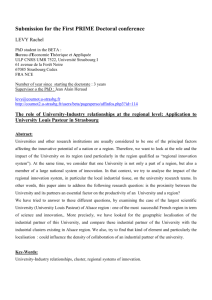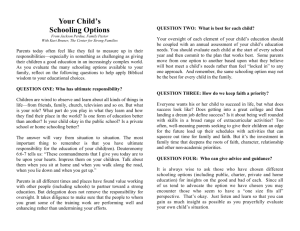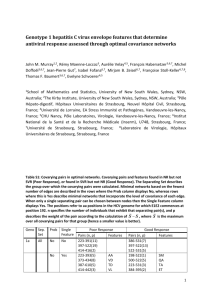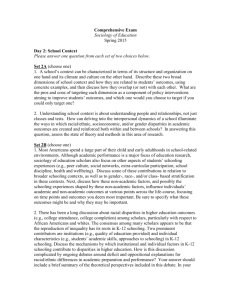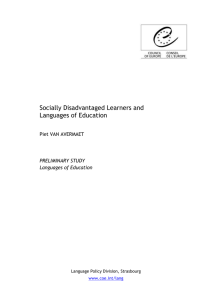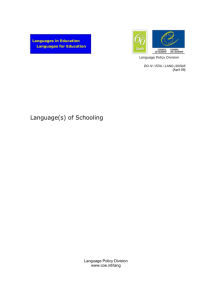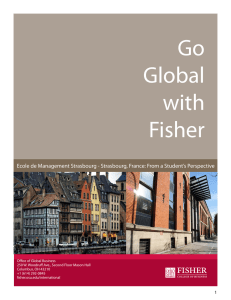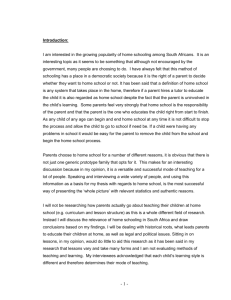Introduction
advertisement
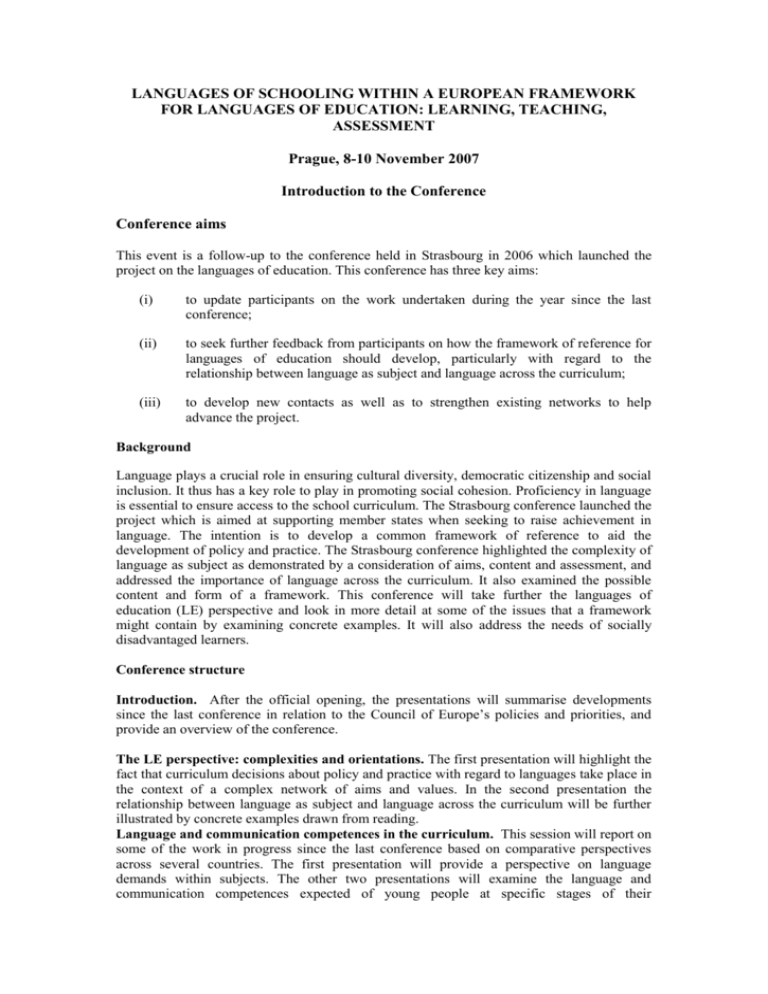
LANGUAGES OF SCHOOLING WITHIN A EUROPEAN FRAMEWORK FOR LANGUAGES OF EDUCATION: LEARNING, TEACHING, ASSESSMENT Prague, 8-10 November 2007 Introduction to the Conference Conference aims This event is a follow-up to the conference held in Strasbourg in 2006 which launched the project on the languages of education. This conference has three key aims: (i) to update participants on the work undertaken during the year since the last conference; (ii) to seek further feedback from participants on how the framework of reference for languages of education should develop, particularly with regard to the relationship between language as subject and language across the curriculum; (iii) to develop new contacts as well as to strengthen existing networks to help advance the project. Background Language plays a crucial role in ensuring cultural diversity, democratic citizenship and social inclusion. It thus has a key role to play in promoting social cohesion. Proficiency in language is essential to ensure access to the school curriculum. The Strasbourg conference launched the project which is aimed at supporting member states when seeking to raise achievement in language. The intention is to develop a common framework of reference to aid the development of policy and practice. The Strasbourg conference highlighted the complexity of language as subject as demonstrated by a consideration of aims, content and assessment, and addressed the importance of language across the curriculum. It also examined the possible content and form of a framework. This conference will take further the languages of education (LE) perspective and look in more detail at some of the issues that a framework might contain by examining concrete examples. It will also address the needs of socially disadvantaged learners. Conference structure Introduction. After the official opening, the presentations will summarise developments since the last conference in relation to the Council of Europe’s policies and priorities, and provide an overview of the conference. The LE perspective: complexities and orientations. The first presentation will highlight the fact that curriculum decisions about policy and practice with regard to languages take place in the context of a complex network of aims and values. In the second presentation the relationship between language as subject and language across the curriculum will be further illustrated by concrete examples drawn from reading. Language and communication competences in the curriculum. This session will report on some of the work in progress since the last conference based on comparative perspectives across several countries. The first presentation will provide a perspective on language demands within subjects. The other two presentations will examine the language and communication competences expected of young people at specific stages of their development in particular contexts. In the group discussion which will follow the intention is to extend the comparative perspective across the countries represented at the conference. Participants will be asked to report on the degree to which the expectations at the end of primary and at the end of compulsory school in their own contexts are similar or differ in scope and content to those presented. Examining existing commonalities and differences is an important stage in the development of a common framework of reference. One of the key questions which the development of a framework raises is to what degree it is possible or desirable to generalise a common set of curriculum expectations within a European context. Participants will also be asked to report on any special arrangements which are made to support socially disadvantaged learners in the development of language. Languages of schooling, socially disadvantaged learners and equal opportunities The group work will lead directly into a plenary session during which a panel of six speakers will present brief case studies and answer questions on how some of the issues raised in the discussion are addressed in different contexts. Aspects of language as subject. It will not be possible to present in detail the work that has gone on in the intervening year since the last conference. However the presentations will provide a brief overview of some of this work. The language as subject working group will present perspectives on the literary canon and on writing genres in language as subject. Aspects of Language Across the Curriculum: Commonalities, specificities and possible implications for LS and language education policies Language across the curriculum (LAC) has been a key focus: access to the full curriculum requires proficiency in language which cannot be developed only in the context of language as subject. Conversely, learning any school subject is in large part a process of developing language. The examples from science, mathematics and history will highlight some of the key considerations. One of the central issues here is how the LAC dimension relates to Language as subject and how this should be addressed in a languages of education framework given the target audience(s). The challenge of assessment. The Strasbourg conference provided an overview of general issues related to assessment. Here the focus will be on more concrete examples and challenges. Participants in groups will be presented with three different assessment tasks designed for pupils at the end of primary and at the end of compulsory schooling for analysis. This discussion will lead into the plenary session which will consider how to make the best use of assessment. Languages of education and languages of schooling: perspectives for a framework The final sessions will provide an overview of the conference and will discuss how the project should develop and the role that delegates might play in that process.



